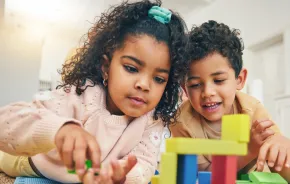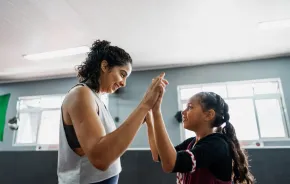 In a toddlers’ music class, a circle of mothers sings a song about the stars—a spiritual with a haunting melody. As we sing, our children take turns carefully placing felt stars just so on a black felt sky. They smile with surprise and delight as the stars take their rightful place in the universe. The children are aware of nothing but their sense of accomplishment and wonder.
In a toddlers’ music class, a circle of mothers sings a song about the stars—a spiritual with a haunting melody. As we sing, our children take turns carefully placing felt stars just so on a black felt sky. They smile with surprise and delight as the stars take their rightful place in the universe. The children are aware of nothing but their sense of accomplishment and wonder.
And during this sweet interlude we, their parents, can briefly forget that terrorists attacked the United States only hours before.
When something horrible happens, the primordial instinct to protect your children kicks in with vigor. I want to shield mine from frightening television images of the attacks on the World Trade Center and the Pentagon and keep them away from conversations about the evil forces that caused these things to happen. So we spend September 11th in strange oblivion, driving out to the suburbs to shop for school clothes, sharing a chocolate-covered graham cracker before heading home.
My daughters don’t know that I am trying to avoid driving on freeways and bridges that might be targets of future attacks. In the car, instead of taking turns listening to kids’ music or mine, I bargain for brief snatches of the news, explaining that “something happened.” Weeks later I will be surprised when my older daughter Melanie begins using this expression as a catch-all excuse for her mercurial behavior.
After the kids go to bed, I am finally able to digest the horrific details of the day. I wonder aloud to Jeff whether we should send Melanie to her first day of preschool the next morning. Though I expect no threat to our little corner of America, the thought of having her out of my sight—even for a few hours—is unnerving. At school orientation the week before, I’d gotten unexpectedly emotional when asked to sign forms releasing the school from liability should anything happen during field trips.
Now that the unthinkable has occurred, I wonder why I was in such a hurry to send Melanie out from under my protective wing.
We decide to avoid disruption. Life is topsy-turvy enough and we don’t know how to deal with the recent changes in Melanie. A summer trip to Maine to visit family has left her raw and clingy, prone to violent temper tantrums, refusing to sleep alone. She has decided to move from her crib to a bed, is potty training herself and is dealing with powerful feelings of jealousy, as her baby sister Maya becomes more active. And she is also starting preschool. In terms of the stress they produce, for a two-and-a-half-year-old these changes are akin to the adult concerns of death, divorce, moving and job change. Also, I read in my parenting books, this is the age when children begin to experience fear.
Fear. We try talking about it.
“Are you afraid to sleep alone in your room?” we ask, half hoping she will identify a monster under the bed that we can chase away.
Melanie professes no fear, but runs into our room crying each night, comforted only if one of us sleeps with her. During the day she begins to use the concept of fear freely, more to reflect a two-year-old’s inner turmoil over impending independence and the power of choice, than to express real terror.
“Do you want a bagel for breakfast?” we ask.
“No, I’m afraid of bagels!” she responds.
The nighttime sleep disruption continues. So does her erratic behavior during the day. I feel suffocated by her neediness, exhausted by her emotional outbursts and my own emotional response to them. Finally, in desperation I call her pediatrician.
“Melanie is suffering from anxiety and needs you now more than ever,” she tells me. “Make a nest on the floor of your room so she can be near you when she is upset at night.”
Jeff rises to the occasion and lays out a double futon with soft yellow blankets. He adorns it with Melanie’s favorite stuffed cats and an array of brightly colored picture books. I am not pleased.
“You’ve made too nice a nest!” I wail. “Now she’ll NEVER sleep in her own room!”
Each night Melanie comes to our room and I begrudgingly go to sleep with her in the nest. Each day she demands bear hug after bear hug, usually when I am occupied with her baby sister. Sleep deprived and frustrated, feeling that I have nothing more to give, I wonder when her anxiety would be alleviated. When will things return to normal?
In the meantime, the country struggles to make sense of jets crashing into towers, bodies falling from the sky, huge numbers of missing people. I remain strangely numb. People want to speculate on the political motivation for the attacks but I, a former diplomat with experience in the Islamic world, don’t want to talk about it. The newspapers are filled with the extraordinary details of how the plots were masterminded. I want to find answers in parenting books instead.
As the days pass and a shocked country grieves, I shut out the turmoil in the world and become more and more consumed by the turmoil in my own home.
Finally, one morning I cry as I listen to a radio story about a hero of Flight 93, who left behind a wife and three-month-old daughter. Later, I speak with a friend in New York, the mother of two daughters roughly the same ages as mine. Then I realize why I have deliberately turned inward. My kids still have the luxury of innocence. Theirs don’t, and neither do any of the children left without a parent as a result of these attacks. One day I will have to explain about murder and guns and evil and disease and divorce and the countless senseless human tragedies that can’t be fixed. But not now. Not yet. I still have some time.
So I decide to embrace my ability to make Melanie’s world a safe haven and concentrate on the things I can make better. Each night at bedtime I take her outside. We look up at the sky, identify the stars and I sing her the star song. When she cries in the middle of the night, I willingly snuggle up in the nest with her. During the day I am freer with bear hugs. I want to do all in my power to dispel any anxiety she feels and to forestall the inevitable—the wiping away of innocence as she learns to be afraid of bigger things, things I can’t protect her from. It’ll happen soon enough.
About a week after the attacks, when we go outside to sing the star song, there is a lone airplane in the evening sky—the first I have seen since September 11. For me it signifies so much—the horror that has occurred, the need for life to continue as normal. I wonder if I will ever look at an airplane the same way again.
But for Melanie these are just magical, twinkling lights. It is still too light to see any stars so I point at the airplane lights and sing:
Star shining, number, number one, number two, number three
Oh my, my, my, my
Oh my, my, my, my, my
As she burrows her head against my shoulder, Melanie doesn’t realize that the stars are not out tonight. I am glad. And I wish I could believe in magic again too.
 Alison Krupnick is ParentMap's Education Editor and a former world-traveling diplomat turned minivan-driving mom and writer. She chronicled her transformation in her book Ruminations from the Minivan, musings from a world grown large, then small, from which this essay is excerpted. Alison and daughter Melanie, now 14, listened to President Obama's speech on Syria together.
Alison Krupnick is ParentMap's Education Editor and a former world-traveling diplomat turned minivan-driving mom and writer. She chronicled her transformation in her book Ruminations from the Minivan, musings from a world grown large, then small, from which this essay is excerpted. Alison and daughter Melanie, now 14, listened to President Obama's speech on Syria together.











